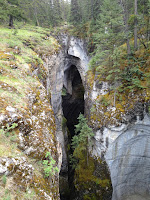5/15 – 5/17/2016 –Banff AB CN– Happily the border crossing
at Roosville British Columbia was a breeze.
The border patrol asked a few simple questions, with the biggest concern
about weapons, which are a big no no in CN, and we were on our way. Well we thought Glacier NP was amazing until
we arrived in Alberta CN. The ride
through Kootenay NP on the way to the campground in Canmore AB was just the
beginning of the beautiful Canadian Rockies.
We arrived at the campground situated in the Bow Valley and had a
panoramic view of the mountains without even getting out of the motorhome. After we set up the motorhome, walked the
dogs, did some food and alcohol shopping, and ate dinner, we decided to take a
walk and window shop the quaint little town center. Biking is definitely the favorite activity in
the area as we saw hundreds of bikers in our journey. Another observation is that the cost of
living here is outrageous, alcohol is
almost double the prices we were paying in FL, food is 25% higher, gas is $1.06
a liter, post card stamps are $1.20 each, and housing in the area we are
staying average $500K, maybe the high costs are for location and scenery, but
you can break the budget pretty quick…LOL….
As we set out on the Trans Canada Highway the jagged mountain
peaks are absolutely the best scenery we have experienced in our travels so far,
with large arched overpasses that were built solely for wildlife to pass over
the highways in safety. We first visited
Lake Louise, the most famous glacial lake in the Canadian Rockies, which was
absolutely more beautiful than you could imagine. Surrounded by Mt Victoria, Victoria Glacier,
Mt Lefroy, Mt Fairview, and Fairmount Chateau Hotel make the entire area
picture perfect. The water was a
beautiful turquoise, and stays frigid year round.

From Lake Louise we traveled the scenic Bow
Valley Parkway and were treated to Johnston Canyon waterfalls, the winding Bow
River and a herd of Big Horn Sheep who were very cooperative with a photo
session.


Next we were off to the town of Banff, which is the highest
town in Canada at 4,537 ft. We took the gondola ride to the top of Sulfur
Mountain and hiked to the Sulfur Mountain Cosmic Ray Station to observe the
beauty of Banff townsite and valley from some 9,000 feet, totally amazing. We also enjoyed Bow Falls, flowing over
limestone bedrock between Mt Rundle and Tunnel Mountain, creating rapids as the
Bow and Spray River join forces. The
Cave and Basin National Historic Site was closed, but we were able to stroll
the boardwalk which wanders up the mountain to the source of the mineral
springs and sulfur pools. We finished
the day strolling the streets and shops in the downtown area of this beautiful
and historic town.




 |
| Hot Sulfur Spring |
 |
| Hot Sulfur pool |
We started off Tuesday 5/17 with a ride up the Trans Canada
Highway to the Icefields Parkway for about 60 miles from the campground, which
by the way translates to about 100km, yes we are bombarded and struggling
greatly with the metric system, with meters, liters and grams have us spinning. Our first stop was Bow Summit which is the
highest point on the parkway at 6,785 ft, which is the starting point to a
short hike to Peyto Lake where we were dazzled with the bluest glacial water
you have ever seen and a wide view of the Mistaya Valley. Too bad the pictures don't show how royal blue the water was.


From there we descended to Bow Lake which is
the source for the Bow River which flows through Banff and Calgary fed by the
Bow Glacier. Further down the parkway
was the Crowfoot Glacier which could be viewed roadside and we also spotted our
first Black Bear only about 20 feet off the highway and we actually got his
picture.



On the way back to our
campground we stopped at Lake Minnewanka, the largest lake in Banff NP and the
only one which power boats are permitted.
A very unusual fact about Lake Minnewanka is the lake is a high altitude
dive site where divers can view what is considered the best preserved example
of a submerged historic village in Canada.
The village of Minnewanka Landing established in 1888 was completely
flooded in 1941 by the Calgary Power Company under the War Measures Act in
order to create a dam for much need power during WW II. We will continue our exploration in the
Motorhome on Wednesday on our way to our next campground just east of Jasper
NP.











































































